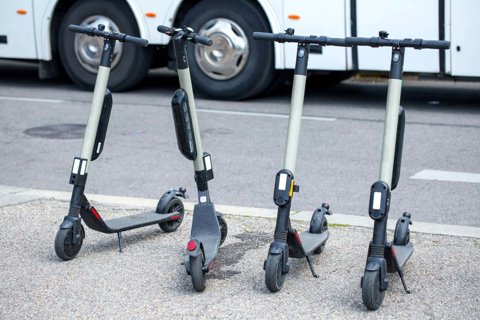Rental E-Scooters - What Are the Safety Risks?
The recent change in the law creates many potential road accident risks. For example:
- E-Scooters don’t have mirrors or indicators, so riders can’t signal to other road users or see vehicles approaching from behind
- E-Scooters can’t always cope with uneven road surfaces and defects
- Riders won’t be in a stable standing position when in motion, so they’re much more likely to be thrown off than cyclists
- Riders may travel without wearing helmets and other safety equipment, and E-Scooter lights aren’t as bright as those on bicycles, so they’re less visible at night
- E-Scooters are much quieter than cars, so can pose a risk to pedestrians, particularly for blind or partially sighted people
- E-Scooter riders may break the law and ride them on pavements, or weave between the road and pavements without warning
It’s worth remembering that since rented E-Scooters are insured by the rental company, you’ll need their details if an accident does happen, as well as those of the rider.
What Does the Law Say on E-Scooters?
You can now ride a rented E-Scooter on roads in England and Wales, although they are banned on pavements. Their speed is limited to 15.5 mph and riders must be over 16 years old.
Anyone riding an E-Scooter must also carry a full or provisional car, motorcycle, or moped license. Personal E-Scooters can only be used on private land, so you can’t legally ride it on the road.
Trials of E-Scooter rental schemes are being carried out across the country, and the Government believes they offer a clean and cost-effective mode of travel. Ministers also hope they may help reduce the number of people using public transport and make social distancing easier.
But, any or all of the safety issues we’ve highlighted could possibly cause a road traffic accident and potentially a serious injury.
England has already seen its first death involving an E-Scooter, as in 2019, YouTuber and TV presenter Emily Hartridge was riding one when she was hit by a lorry at a busy London roundabout.
Reported E-Scooter Accidents
In 2022, the Government published a report on the figures of E-Scooter accidents in Great Britain.
Based on the figures, there were:
- 1,402 E-Scooter collisions
- 341 of the collisions involved one vehicle (the E-Scooter)
- 1,492 casualties were reported as a result of E-Scooter collisions
- 1,040 minor injuries in collisions involving E-Scooters
- 440 serious injuries in collisions involving E-Scooters
- 12 fatal accidents in collisions involving E-Scooters
Out of the above figures, 11 of the people who were killed in a collision that involved E-Scooters were the E-Scooter user, with the other one person being a pedestrian.
Based on the time of day of when these accidents occurred, we can determine that E-Scooter users are primarily using them to commute to work. In both 2021 and 2022, the trends remained the same. There are upward trends starting from 6:00 am which end at 16:00 pm. There is a dip at 10:00 am with downward trends from 17:00 pm.
Common Causes of E-Scooter Accidents
Much like any other accident, E-Scooter accidents can occur under a range of circumstances. Here’s a list of some reasons why E-Scooter accidents occur:
- Collisions
- Speeding
- Road or pavement defects
- Negligence
- E-Scooter malfunction
- Rider inexperience
- Multiple vehicles
E-Scooter accidents can be a result of the E-Scooter rider being directly at fault or multiple road users contributing to the accident in equal measure. Part of the claims process is determining who is at fault for causing the accident and whether compensation is due.

FAQs about E-Scooter Accidents
What Should I Do If I’m Involved in an E-Scooter Accident?
If you have been in an accident that involved an E-Scooter, the first thing you should do is report it to the police as soon as you can. This is an important step especially if the E-Scooter user is responsible and they flee the scene.
If you don’t report the accident to the police, this may harm your claim for compensation later down the line. Your health and well-being in the priority, so you should make sure you seek the appropriate medical treatment for your injuries.
If you’re able to, make sure you take down the details of anyone who witnessed the accident, including their names, addresses, and contact numbers. If possible, you should take photographs of the scene and any damage that was caused as a result of the accident.
Photographic evidence will help to strengthen your case by painting a picture of what happened and where it happened. You should also document your injuries in photographs too, to show how much impact the accident had on you.
How Much Compensation Am I Entitled To?
The compensation that you will receive will depend on a number of factors, such as the severity of your injuries and any long-term effects. We will also take into consideration the circumstances surrounding the accident and how it happened. There may be additional factors to look into that can drastically change your claim.
If you have incurred any expenses such as medical expenses, this can also be taken into account. Our expert road accident solicitors will be able to provide you with an idea of how much you are likely to achieve in compensation.
How Long Will My Claim Take?
The length of your case will vary depending on several factors. For example, your case may be complicated wherein the other party may not accept liability. If they dispute their part in the accident and that it was their fault, this may delay the claim by several months.
It may also take some time to gather all the evidence that we need for your claim, such as medical reports and witness statements. Evidence is crucial to your claim, so this will need to be completed before we can pursue a claim.
How Long Do I Have To Complete a Claim for Compensation?
For most personal injury claims in the UK, you have 3 years to start a claim for compensation. This means that you will have 3 years from the date of the accident to open a claim. There is an exception to this rule whereby if you are unaware of the injuries you sustained until a later date, the 3 year period starts from the ‘date of knowledge’.
If a child was involved in the accident, they have until they are 21 years old to open a claim. Alternatively, a parent or guardian can start a claim on their behalf straightaway.
Do I Have to Go to Court?
No, not all personal injury claims settle in Court. In fact, most of our cases are settled outside of Court as we are able to get the other party to accept liability. As long as the other party accepts responsibility for the accident and they agree to the settlement, you won’t need to go to Court. Although, if they dispute it entirely, we won’t hesitate in initiating Court proceedings. While our aim is to always try and settle out of Court where possible, sometimes it just doesn’t happen that way.

How We Can Help Your Claim
With E-Scooters being a recent addition to the roads, there is a right for concern surrounding public safety.
If you have been injured in an accident that involved an E-Scooter, you may be able to claim compensation. The first step is to contact our expert Personal Injury Lawyers to arrange a free claim assessment.
We’ll listen to your story and determine whether your claim is likely to be successful. We will consider the injuries that you sustained and any long-term impacts that will help you seek compensation. While compensation won’t change what happened, it will help you to get your life back on track.
If we are happy to take on your claim, we’ll get to work on your case straightaway. In the first instance, we will contact the other party to get them to accept responsibility outside of Court. If they do accept liability, we will try to achieve an interim payment of compensation.
If they don’t accept responsibility, we will then start Court proceedings on your behalf. We understand that taking the claim to Court may be overwhelming, but we are here every step of the way. We will gather all the evidence required to strengthen your case to make sure we are prepared for showcasing why you deserve the compensation we feel you are entitled to.












